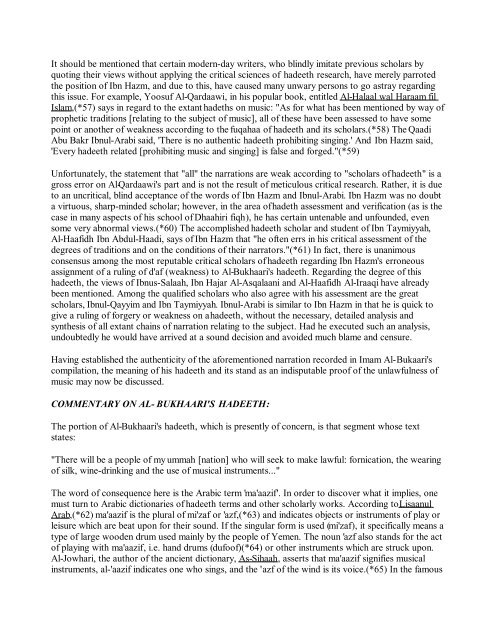The Islamic Ruling on Music and Singing - Enjoy Islam
The Islamic Ruling on Music and Singing - Enjoy Islam
The Islamic Ruling on Music and Singing - Enjoy Islam
Create successful ePaper yourself
Turn your PDF publications into a flip-book with our unique Google optimized e-Paper software.
It should be menti<strong>on</strong>ed that certain modern-day writers, who blindly imitate previous scholars by<br />
quoting their views without applying the critical sciences of hadeeth research, have merely parroted<br />
the positi<strong>on</strong> of Ibn Hazm, <strong>and</strong> due to this, have caused many unwary pers<strong>on</strong>s to go astray regarding<br />
this issue. For example, Yoosuf Al-Qardaawi, in his popular book, entitled Al-Halaal wal Haraam fil<br />
<strong>Islam</strong>,(*57) says in regard to the extant hadeths <strong>on</strong> music: "As for what has been menti<strong>on</strong>ed by way of<br />
prophetic traditi<strong>on</strong>s [relating to the subject of music], all of these have been assessed to have some<br />
point or another of weakness according to the fuqahaa of hadeeth <strong>and</strong> its scholars.(*58) <str<strong>on</strong>g>The</str<strong>on</strong>g> Qaadi<br />
Abu Bakr Ibnul-Arabi said, '<str<strong>on</strong>g>The</str<strong>on</strong>g>re is no authentic hadeeth prohibiting singing.' And Ibn Hazm said,<br />
'Every hadeeth related [prohibiting music <strong>and</strong> singing] is false <strong>and</strong> forged."(*59)<br />
Unfortunately, the statement that "all" the narrati<strong>on</strong>s are weak according to "scholars of hadeeth" is a<br />
gross error <strong>on</strong> Al-Qardaawi's part <strong>and</strong> is not the result of meticulous critical research. Rather, it is due<br />
to an uncritical, blind acceptance of the words of Ibn Hazm <strong>and</strong> Ibnul-Arabi. Ibn Hazm was no doubt<br />
a virtuous, sharp-minded scholar; however, in the area of hadeth assessment <strong>and</strong> verificati<strong>on</strong> (as is the<br />
case in many aspects of his school of Dhaahiri fiqh), he has certain untenable <strong>and</strong> unfounded, even<br />
some very abnormal views.(*60) <str<strong>on</strong>g>The</str<strong>on</strong>g> accomplished hadeeth scholar <strong>and</strong> student of Ibn Taymiyyah,<br />
Al-Haafidh Ibn Abdul-Haadi, says of Ibn Hazm that "he often errs in his critical assessment of the<br />
degrees of traditi<strong>on</strong>s <strong>and</strong> <strong>on</strong> the c<strong>on</strong>diti<strong>on</strong>s of their narrators."(*61) In fact, there is unanimous<br />
c<strong>on</strong>sensus am<strong>on</strong>g the most reputable critical scholars of hadeeth regarding Ibn Hazm's err<strong>on</strong>eous<br />
assignment of a ruling of d'af (weakness) to Al-Bukhaari's hadeeth. Regarding the degree of this<br />
hadeeth, the views of Ibnus-Salaah, Ibn Hajar Al-Asqalaani <strong>and</strong> Al-Haafidh Al-Iraaqi have already<br />
been menti<strong>on</strong>ed. Am<strong>on</strong>g the qualified scholars who also agree with his assessment are the great<br />
scholars, Ibnul-Qayyim <strong>and</strong> Ibn Taymiyyah. Ibnul-Arabi is similar to Ibn Hazm in that he is quick to<br />
give a ruling of forgery or weakness <strong>on</strong> a hadeeth, without the necessary, detailed analysis <strong>and</strong><br />
synthesis of all extant chains of narrati<strong>on</strong> relating to the subject. Had he executed such an analysis,<br />
undoubtedly he would have arrived at a sound decisi<strong>on</strong> <strong>and</strong> avoided much blame <strong>and</strong> censure.<br />
Having established the authenticity of the aforementi<strong>on</strong>ed narrati<strong>on</strong> recorded in Imam Al-Bukaari's<br />
compilati<strong>on</strong>, the meaning of his hadeeth <strong>and</strong> its st<strong>and</strong> as an indisputable proof of the unlawfulness of<br />
music may now be discussed.<br />
COMMENTARY ON AL-BUKHAARI'S HADEETH:<br />
<str<strong>on</strong>g>The</str<strong>on</strong>g> porti<strong>on</strong> of Al-Bukhaari's hadeeth, which is presently of c<strong>on</strong>cern, is that segment whose text<br />
states:<br />
"<str<strong>on</strong>g>The</str<strong>on</strong>g>re will be a people of my ummah [nati<strong>on</strong>] who will seek to make lawful: fornicati<strong>on</strong>, the wearing<br />
of silk, wine-drinking <strong>and</strong> the use of musical instruments..."<br />
<str<strong>on</strong>g>The</str<strong>on</strong>g> word of c<strong>on</strong>sequence here is the Arabic term 'ma'aazif'. In order to discover what it implies, <strong>on</strong>e<br />
must turn to Arabic dicti<strong>on</strong>aries of hadeeth terms <strong>and</strong> other scholarly works. According to Lisaanul<br />
Arab,(*62) ma'aazif is the plural of mi'zaf or 'azf,(*63) <strong>and</strong> indicates objects or instruments of play or<br />
leisure which are beat up<strong>on</strong> for their sound. If the singular form is used (mi'zaf), it specifically means a<br />
type of large wooden drum used mainly by the people of Yemen. <str<strong>on</strong>g>The</str<strong>on</strong>g> noun 'azf also st<strong>and</strong>s for the act<br />
of playing with ma'aazif, i.e. h<strong>and</strong> drums (dufoof)(*64) or other instruments which are struck up<strong>on</strong>.<br />
Al-Jowhari, the author of the ancient dicti<strong>on</strong>ary, As-Sihaah, asserts that ma'aazif signifies musical<br />
instruments, al-'aazif indicates <strong>on</strong>e who sings, <strong>and</strong> the 'azf of the wind is its voice.(*65) In the famous

















